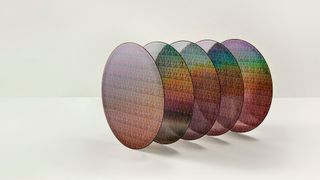Uh oh, Intel and AMD - Meta is making strides towards its own custom chips
Meta is building out a new team to help boost performance in the datacenter

Meta has poached a senior silicon engineer from Intel in a move that appears designed to kickstart the development of custom server chips for its datacenters.
Jon Dama joined Meta earlier this month as Director for Silicon for the infrastructure hardware group, in which role he will take charge of multiple design teams focused on “innovating the datacenter for scale”.
Meta has not indicated precisely what Dama will be working on, but his role in the development of Intel’s Infrastructure Processing Units (IPUs) - which free up CPU performance by offloading certain functions - offers a clue. TechRadar Pro has asked the company for comment.
Bad news for Intel and AMD?
Although Meta’s ambitions to develop custom silicon for its upcoming AR glasses is already public knowledge, the new hire is among the first few indications the firm intends to develop chips to fuel its datacenters too.
Given Meta recently signed a long-term deal with AMD, the intention is unlikely to be to replace third-party datacenter processors outright, but rather to develop specialized silicon to enable specific use cases.
The move can be seen as a continuation of an emerging trend that has seen multiple cloud providers design their own ARM-based silicon in recent years. In 2018, AWS unveiled its Graviton line (now in its third generation), which has proved to be an immense success, and Alibaba Cloud is also working on a powerful new line of custom chips. Recent activity suggests Microsoft has similar plans to support its own cloud computing business.
The main incentive for operators of large-scale datacenters to develop their own custom silicon is the ability to more closely match the hardware with the requirements of their specific workloads.
Are you a pro? Subscribe to our newsletter
Sign up to the TechRadar Pro newsletter to get all the top news, opinion, features and guidance your business needs to succeed!
In conversation with TechRadar Pro earlier this year, AWS HPC specialist Brendan Bouffler explained that the Graviton series has given the company far greater freedom to optimize its operations, something Intel and AMD simply cannot provide.
“Generally speaking, removing unnecessary features means you have much closer control over the failure profile, and having control over the silicon has given us a similar advantage,” he said.
“Graviton3 is optimized up the wazoo for our data centers, because we’re the only customer for these things. We know what our conditions are, whereas other manufacturers have to support the most weird and unusual data center configurations.”
Intel, for its part, claims it is unphased by the emergence of powerful custom silicon for the datacenter. In fact, the company sees an opportunity here for Intel Foundry Services, its new pure-play foundry arm.
Speaking at Intel Vision in Dallas last week, Sandra Rivera, head of datacenter and AI, had the following to say:
“Hyperscalers are some of our big volume drivers, and they are counting on us to deliver sustainable, durable capability for their data centers. For their large-scale deployments, they still rely on Xeon."
"But they also want durable innovation. We can deliver some of that with Xeon, and there is also the opportunity with our foundry business to enable hyperscalers to innovate on unique IP."
Via The Register

Joel Khalili is the News and Features Editor at TechRadar Pro, covering cybersecurity, data privacy, cloud, AI, blockchain, internet infrastructure, 5G, data storage and computing. He's responsible for curating our news content, as well as commissioning and producing features on the technologies that are transforming the way the world does business.
